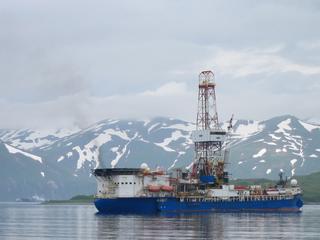Shell Oil Gets Conditional Approval for Arctic Drilling

Monday, May 11 2015
Shell has gotten another green light for its oil exploration season in the Chukchi Sea this summer.
The Bureau of Ocean Energy Management gave conditional approval for Shell’s exploration plan on Monday morning.
Agency spokesman John Callahan says the conditions include getting permits from other federal agencies to actually drill for oil, work around marine mammals and discharge wastewater.
"So while our agency has conditionally approved this plan, there are some things Shell still has to do before it can go out," Callahan says.
Shell has described a more concentrated campaign of activity than it had last time it attempted to drill in the Arctic. It plans to use two drill rigs and up to 40 round-trip helicopter trips a week -- more than triple the number from its previous plan.
The executive director of the Alaska Eskimo Whaling Commission asked the government last month to consider the effect of noise from Shell’s proposed operations. Arnold Brower Jr., on behalf of the commission, says they could create a "fence of sound" and displace the whales.
Shell spokeswoman Megan Baldino says they’re hoping the environmental permits they wind up with will be ”practical" and "usable,” and will come through in time for a full summer season.
"We achieved these permits in 2012 and we’re looking forward to their delivery for 2015," she says.
2012 was marked by a range of mishaps, including grounded drill rigs. And Susan Murray, a vice president for conservation group Oceana, says Shell’s not ready for another try.
"If Shell hasn’t shown us yet they can take bad decisions out of the equation, and their contractors can’t take bad decisions out of the equation, they don’t belong in the offshore Arctic yet," she says. "The risk is simply too high."
Shell’s rigs are still set to head north in the next few weeks, though. Along with their permits, they're waiting on a final plan from the Coast Guard for buffer zones around their rigs when they’re staged in Unalaska and Kotzebue.
This story has been updated. APRN's Liz Ruskin contributed reporting.



